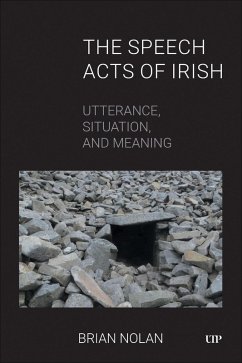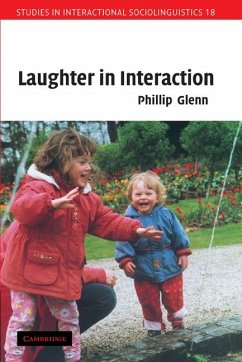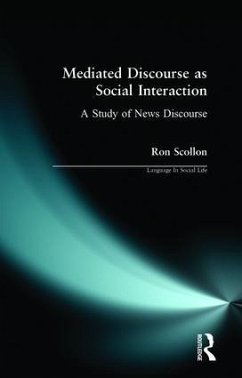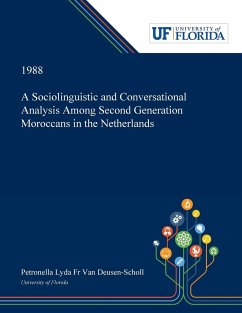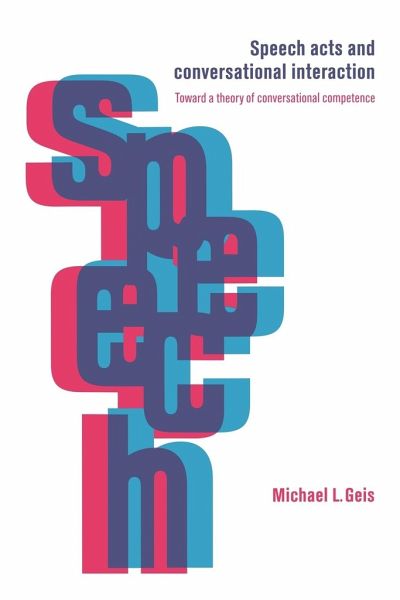
Speech Acts and Conversational Interaction

PAYBACK Punkte
24 °P sammeln!
This book unites speech act theory and conversation analysis to advance a theory of conversational competence.This book unites speech act theory and conversation analysis to advance a theory of conversational competence. It is predicated on the assumption that speech act theory, if it is to be of genuine empirical and theoretical significance, must be embedded within a general theory of conversational competence capable of accounting for how we do things with words in naturally occurring conversation, and it can usefully be seen as a synthesis of traditional speech act theory, conversation ana...
This book unites speech act theory and conversation analysis to advance a theory of conversational competence.
This book unites speech act theory and conversation analysis to advance a theory of conversational competence. It is predicated on the assumption that speech act theory, if it is to be of genuine empirical and theoretical significance, must be embedded within a general theory of conversational competence capable of accounting for how we do things with words in naturally occurring conversation, and it can usefully be seen as a synthesis of traditional speech act theory, conversation analysis, and artificial intelligence research in natural language processing. Michael L. Geis analyses a variety of naturally occurring conversations, presenting them within a framework of computational interest and within discourse representation theory. In particular, he offers an explicit mapping of semantic and pragmatic (i.e. speech-act-theoretic) meaning features and politeness features into so-called conventionalized indirect speech act forms.
Review quote:
"...gives the reader the whole picture from the beginning."
Inge Egner, Notes on Linguistics
"...much of interest on speech act theory, conversation analysis, and conversational interaction."
Jef Verschueren, Anthropological Linguistics
"This is an important book. It develops a new, cognitive theory of conversational interaction, Dynamic Speech Act Theory..."
Kimary N. Shahin, Canadian Journal of Linguistics
Table of contents:
1. The nature of speech acts; 2. Meaning and force; 3. The structure of communicative interactions; 4. Interactional effects; 5. Indirect speech acts; 6. Conventions of use; 7. The structure of conversation; 8. Utterance generation; References; Index.
This book unites speech act theory and conversation analysis to advance a theory of conversational competence. It is predicated on the assumption that speech act theory, if it is to be of genuine empirical and theoretical significance, must be embedded within a general theory of conversational competence capable of accounting for how we do things with words in naturally occurring conversation, and it can usefully be seen as a synthesis of traditional speech act theory, conversation analysis, and artificial intelligence research in natural language processing. Michael L. Geis analyses a variety of naturally occurring conversations, presenting them within a framework of computational interest and within discourse representation theory. In particular, he offers an explicit mapping of semantic and pragmatic (i.e. speech-act-theoretic) meaning features and politeness features into so-called conventionalized indirect speech act forms.
Review quote:
"...gives the reader the whole picture from the beginning."
Inge Egner, Notes on Linguistics
"...much of interest on speech act theory, conversation analysis, and conversational interaction."
Jef Verschueren, Anthropological Linguistics
"This is an important book. It develops a new, cognitive theory of conversational interaction, Dynamic Speech Act Theory..."
Kimary N. Shahin, Canadian Journal of Linguistics
Table of contents:
1. The nature of speech acts; 2. Meaning and force; 3. The structure of communicative interactions; 4. Interactional effects; 5. Indirect speech acts; 6. Conventions of use; 7. The structure of conversation; 8. Utterance generation; References; Index.





